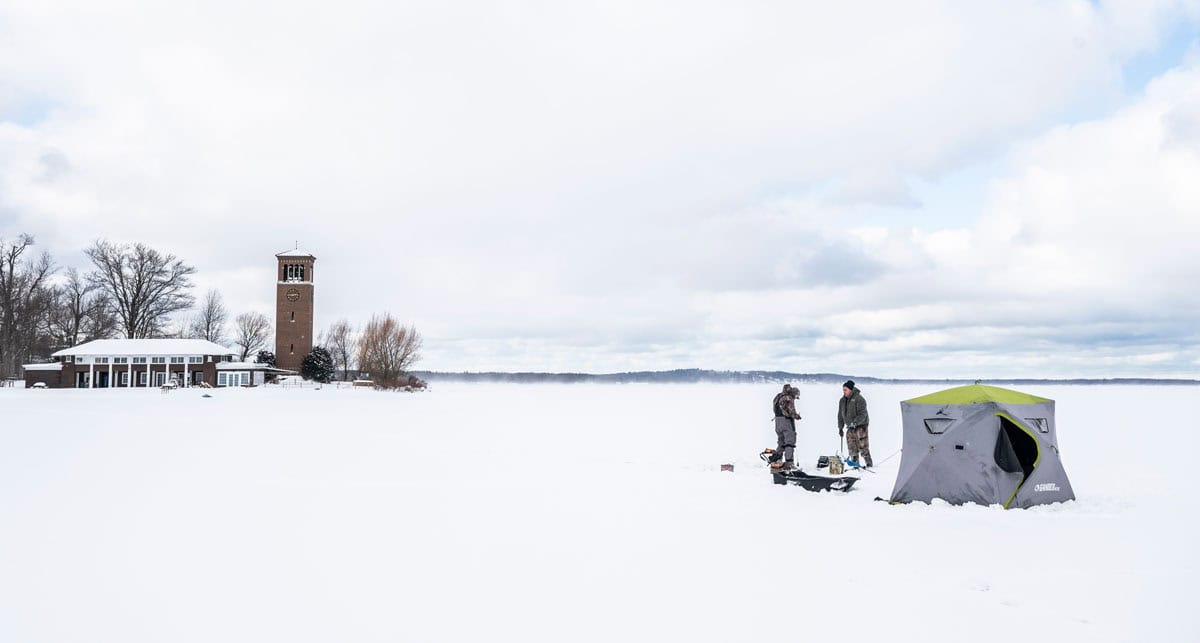Wonder Winterland?
Chautauqua explores the impact of climate change on winter recreation economies
As someone who prefers Boots over Birkenstocks, there’s nothing I love more than snow — and lots of it! Chautauqua in winter is a wonderland, revealing a whole new world of skiing, skating, ice fishing and snowmobiling that might seem alien to those who visit Chautauqua primarily in the temperate months. One of my fondest memories of Chautauqua is skiing the length of frozen Chautauqua Lake on a clear crisp quiet winter morning in 2022 with then-Chautauqua Lake Program Manager Toby Shepherd.
But just two winters later, for the first time in recorded history, Chautauqua Lake failed to freeze solid in 2024. No skiing. No ice fishing. No snowmobiling. No famed ice castle at the Mayville Winter Festival. And then winter came roaring back in 2025 with feet upon feet of snow that recalled the “good old days” of winters past. What gives? Do you ever wonder what’s happening to our winterland?
While these wild weather swings might seem chaotic and unfathomable to us, meteorologists and climate scientists actually have a pretty good idea about what’s going on.
According to the Great Lakes Integrated Science and Assessments Center (GLISA), the Great Lakes region receives greater amounts of snowfall because evaporation from the lakes enhances precipitation. Lake-effect snowfall only occurs when the lakes are not completely frozen over, leading to the seemingly contradictory outcome of warmer winters = less ice = more snow.
Data bears this out, showing that since the early 1950s, temperatures have increased on average 2.3oF in the Great Lakes Region, we have had 16 more frost free days per year, total precipitation has increased 14%, and the region has seen a 25% decrease in basin-wide ice cover.
These trends have driven some blockbuster lake-effect snow events in recent years, but climate models show that over the long term, as temperatures continue to rise, lake-effect snows turn increasingly into rain.
And so, what does it mean for our region when skiing, skating, snowmobiling and ice fishing become increasingly rare or unpredictable? That’s exactly the question that Chautauqua aims to explore in our July 23 Forum on Climate Change and Winter Recreation Economies.
The forum will be keynoted by Erin Sprague, CEO of Protect Our Winters (POW), “the outdoor movement for climate impact, powered by the world’s most inspirational athletes, artists and brands.” POW commissioned groundbreaking research showing just how impactful outdoor winter recreation is to our economy.
For example, during the 2015–2016 winter season:
- Nearly 24 million Americans participated in winter sports.
- Skiing and snowmobiling alone supported more than 191,000 jobs and contributed roughly $11.3 billion to the national economy.
- Roughly 1.8 million Americans went ice fishing, and 3.5 million went snowshoeing.
Our forum features a distinguished panel, including Auden Schendler, who for over a quarter century served as senior vice president of sustainability at Aspen One; Barb Pump Executive Director of the Ellicottville Chamber of Commerce; Brian Pender President of the Mayville Chamber of Commerce; and Bill Ward Board President of Chautauqua County Rails to Trails and Chair of the Chautauqua County Visitors Bureau.
We hope you can join us on July 23, 2025, from 12:15 to 2 p.m. at Smith Wilkes Hall for what I think will be a fascinating conversation. And since summer will be in full swing, feel free to wear your Birkenstocks and leave your winter boots behind.
Save Your Trip
Fill out the form below to save your trip. You will receive a link to your saved list via email.
Save Your Favorites
Fill out the form below to save your favorites. You will receive a link to your favorites list via email.
"*" indicates required fields
Notice!
You have now entered the season. Some website content may differ depending on the current season we are in: Summer or Fall/Winter/Spring. You can toggle between the two season options at any time.
